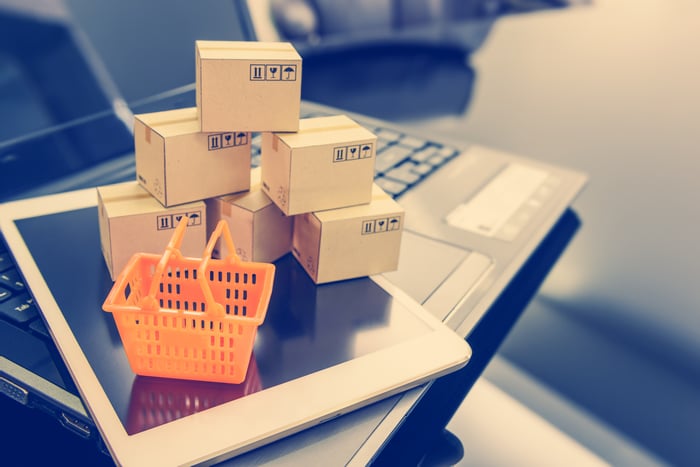Who needs a theme park when you have Wall Street? Since the start of the decade, the three major stock indexes have navigated two separate bull and bear markets.
Although 2023 has featured a sizable rally for Wall Street, the Dow Jones Industrial Average, S&P 500, and Nasdaq Composite remain below their all-time closing highs. For long-term investors, it means opportunities still abound to snatch up high-quality companies at a discount.

Image source: Getty Images.
One of the best aspects of putting your money to work on Wall Street is that it's easier than ever for retail investors to get started or continue on their path to financial independence. Most online brokerages have completely done away with commission fees for trades on major U.S. exchanges, as well as minimum deposit requirements. This means any amount of money -- even $300 -- can represent the perfect amount to invest.
If you have $300 that's ready to invest, and you're 100% certain this cash won't be needed to pay bills or cover emergency expenses, the following three stocks stand out as no-brainer buys right now.
NextEra Energy
The first magnificent stock to add to your portfolio right now with $300 is none other than electric utility NextEra Energy (NEE 1.33%).
After two decades of virtually uninterrupted gains, NextEra's stock has hit the skids in 2023, with higher interest rates and a big uptick in Treasury yields to blame. Higher interest rates will make future projects financed by debt costlier.
Meanwhile, Treasury bonds are virtually risk-free investments offering yields of around 5% at the moment. Most investors flock to utility stocks for their low volatility and market-topping yields. However, investors have been able to net similar yields, with practically no risk to their principal, from Treasury bonds, which has made industry leaders like NextEra Energy less popular among income seekers.
However, NextEra Energy is an industry leader for a reason. Its competitive advantage is its renewable energy portfolio. As of the end of September, NextEra had 34 gigawatts (GW) of clean-energy capacity in operation, including 23 GW of wind capacity and 6 GW of solar capacity. Both figures are high-water marks globally.
Though undertaking clean-energy projects has been costly, it's benefited NextEra's bottom line in a big way. Electricity generation costs have tumbled, leading to a compound annual adjusted earnings growth rate of just shy of 10% over the previous 10 years. By comparison, most electric utilities are growing their earnings per share by a low-single-digit percentage on an annualized basis.
In addition to its world-leading renewables segment, NextEra's traditional utility operations are regulated. In other words, it can't raise rates on its customers without the approval of state-level utility commissions (i.e., the Florida Public Service Commission). While this might sound like a nuisance, it's actually a benefit in disguise. Regulated utilities avoid wholesale pricing, which makes their operating cash flow highly predictable.
Lastly, NextEra Energy is historically inexpensive. Shares are currently trading at 17 times forward-year earnings, which is the cheapest they've been since 2015.
Lovesac
A second no-brainer stock to buy with $300 right now is small-cap furniture retailer Lovesac (LOVE -0.52%).
Like most growth stocks, Lovesac was clobbered during the 2022 bear market. Fears of a potential U.S. recession clearly have investors concerned. If economic growth stalls or reverses, it's expected that consumers will pare back their discretionary spending in a highly cyclical industry (furniture).
But what's interesting about Lovesac is that it's nothing like traditional furniture retailers. This is a company that's completely differentiating itself with its products and omnichannel sales presence.
Lovesac's primary means of standing out from the rest of the pack is its furniture. While originally known for its beanbag-style chairs called "sacs," approximately 90% of net sales now derive from modular couches known as "sactionals." Sactionals can be rearranged dozens of ways to fit most living spaces, and they come with over 200 different cover choices and a multitude of upgrade options (e.g., built-in surround sound). Best of all, the yarn used in these covers is made entirely from recycled plastic water bottles. This makes sactionals unique in their functionality, optionality, and eco-friendliness.
As you can probably guess from these options, sactionals are pricier than traditional sofas and sectional couches. But that's just fine with Lovesac. The company predominantly targets middle- to upper-income clientele with its products. The advantage of this approach is that high-earners are less likely to alter their spending habits during periods of economic instability. In short, it leads to predictable sales and cash flow for Lovesac.
The other differentiating factor with Lovesac is its omnichannel sales platform. While it does have a physical store presence in most U.S. states, it was able to shift a significant percentage of its sales online during the COVID-19 pandemic.
Additionally, it operates popup showrooms and has partnerships with a couple of brand-name businesses -- Best Buy and Costco Wholesale. These alternative channels are improving brand awareness and, most importantly, keeping overhead costs low. The end result should be a consistently higher operating margin than its peers.
Sporting a long-term double-digit growth rate and a forward price-to-earnings ratio below 10, Lovesac is a screaming buy.

Image source: Getty Images.
Alibaba
The third no-brainer stock that's begging to be bought with $300 right now is China-based e-commerce company Alibaba (BABA -1.94%).
Perhaps the biggest thorn in Alibaba's side has been the tightening oversight of Chinese regulators. In 2021, the company was hit with a record fine of $2.75 billion by regulators for its anti-monopoly practices. Alibaba is the leading online marketplace in China. If regulators continue to tighten their grip, its growth rate could be adversely impacted.
Alibaba is also dealing with the recent departure of Daniel Zhang. Zhang was Alibaba's CEO for eight years, and he'd recently stepped down from the CEO role to head the company's burgeoning cloud services division. Investors are visibly concerned about the direction of the company with its key figurehead of nearly a decade no longer there.
Despite these challenges, there are a few reasons for investors to be increasingly optimistic about Alibaba's future.
To begin with, it absolutely dominates the e-commerce arena in China. Based on data from the International Trade Administration, Alibaba's online shopping sites Taobao and Tmall accounted for almost 51% of e-commerce market share in the world's No. 2 economy by gross domestic product. Considering that China's economy is still bouncing back from three years of supply chain constraints during the COVID-19 pandemic, there's reason to believe e-commerce has a lengthy upward trajectory.
Another reason for investors to be excited for Alibaba's future is its cloud services segment. Estimates from tech-analysis company Canalys from the March-ended quarter show Alibaba accounts for 34% of cloud infrastructure service spending in China. That's nearly double its next-closest competitor. Enterprise cloud spending is still in its early stages, which suggests there's a sustained double-digit growth opportunity for the company to take advantage of.
Alibaba wouldn't make the list of no-brainer buys if it wasn't also historically inexpensive. Even factoring in the added regulatory risks of putting your money to work in China, Alibaba is jaw-droppingly cheap at roughly 7 times forward-year earnings.





